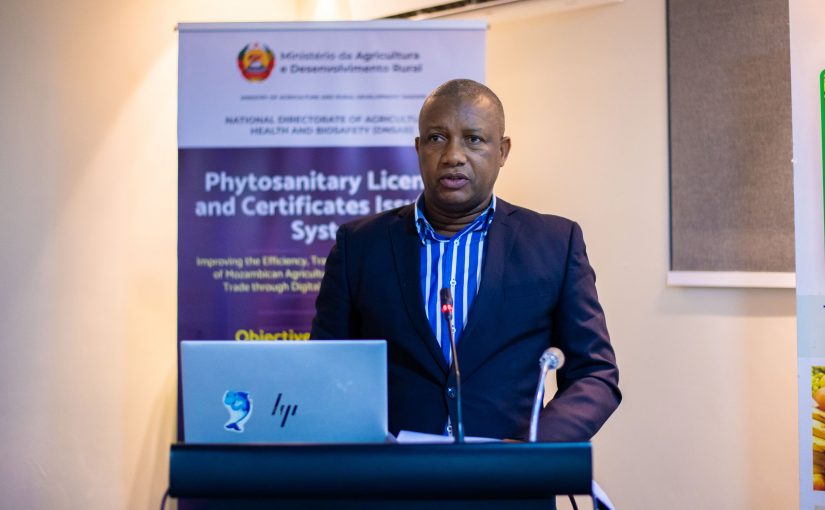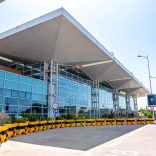Mozambique: Minister of the Economy visits Philip Morris International in Lausanne
Mozambique government and TradeMark Africa roll-out training on Phytosanitary Licenses and Certificates Issuance System

Image: TradeMark Africa
The Government of Mozambique, in partnership with TradeMark Africa (TMA), has commenced sensitisation trainings and system review workshop for government agency staff, importers, and exporters involved in plant health ahead of the implementation of the Phytosanitary Licenses and Certificates Issuance System. This platform is designed to significantly reduce the time and cost of processing permits. The workshop is conducted in partnership with the Ministry of Agriculture and Rural Development (MADER) through its agency, the National Directorate of Agricultural Health and Biosafety (DNSAB), responsible for processing SPS certificates.
Currently, the application, processing, and issuance of SPS certificates are done manually. The process involves filling out and submitting physical forms for inspection requests, sampling, and testing. Plant health assessors then collect samples from plants or plant materials for lab analysis, with the results recorded on physical forms that are submitted to the relevant agency staff for review and approval. This process is time-consuming, costly, and prone to errors or administrative lapses.
“Applicants physically visiting one or many of the Authority’s certification offices in Maputo or at stations across the country means that a lot of productive time is wasted on mundane tasks. This is not tenable if we are to improve the time and reduce the cost of doing business and position Mozambique as an attractive destination for investment,” says Afonso Sitole, Head of Plant Quarantine Department at MADER.
Typically, a lot of the applications include requests for certification for the export and re-export of products such as bananas, mangos, lychees, cashew nuts, seeds, seedlings, and biological control agents. Traders or their authorised agents must visit DNSAB headquarters or any of its 41 regional stations across the country to submit the paperwork and make numerous follow-ups on the status of their submissions before a request is granted or rejected. Applicants also have to visit a physical bank branch to pay the requisite fees.
Other than the high logistics costs due to physical movements, there’s opportunity cost lost in business dealings or transactions. To improve efficiency, reduce time and cost, and enhance government revenues, the ministry, with support from the Governments of Ireland and The Netherlands through TMA, is digitalising the certification process. The new system will provide an end-to-end paperless mechanism for applicants and inspectors, covering application submission, evaluation, inspection, online payment, approval and issuance of the certificates.
The workshop sessions will focus on presenting the trial version (prototype) of the system to participants, by taking them through the export, import, re-export, and transit processes, from registration to acquisition of the phytosanitary certificates, as well as obtaining user feedback on the system’s improvement. This will enhance their familiarity with the protocols of the upcoming system, secure their buy-in, and address any initial issues before full operationalisation.
“This will be a game-changer for all actors in the industry. Once the system is fully operational, the process will be as simple as lodging an application request in the system, paying the necessary fees, and making the required follow-ups from the comfort of their homes or offices. The system will streamline the administrative process, allow proper analysis for ease of decision-making, thereby injecting efficiency into the entire process,” says Carlos Bulo, Agricultural Engineer at FRUTISUL.
This automation initiative is part of TMA’s broader approach to enhance trade facilitation in Africa by leveraging digital solutions at government and private sector agencies for seamless trade. “We are delighted about the potential that this digital system has in transforming the way SPS certificates are processed. This workshop, and many more to come, is not only timely but also a significant step towards improving efficiencies and reducing costs for traders, in turn providing the much-needed impetus to the economy,” remarked Jovin Mwemezi, Director, Southern Africa at TradeMark Africa.
The system will be integrated with the Electronic Single Window system for information exchange on phytosanitary certificate issuance or replacement, as well as import and export authorisation. There are also plans to integrate it with the International Plant Protection Convention (IPPC) e-Phyto hub for sharing the issued certificates with counterpart agencies in destination markets as well as receiving certificates for import consignments.

About the National Directorate of Agricultural Health and Biosafety
The National Directorate of Agrarian Health and Biosafety (DNSAB) is one of the Directorates of the Ministry of Agriculture and Rural Development (MADER). This department is responsible for ensuring the country’s sanitary and phytosanitary defence, through border and internal control, ensuring the prevention of the introduction and/or spread of pests, exotic diseases, animal diseases, in the import and/or internal circulation of plant products and by-products. and animals as well as ensuring supervision/inspection and certification of imports, exports of plant and animal products.
DNSAB is headquartered in the MADER building, Lusaka Agreement Avenue, Mozambican’s Heroes Square in Maputo, has as one of its powers the issuing of Licenses and Sanitary and Phytosanitary Certificates (SPS) for the import, export and re-export of various agricultural products in Mozambique.
DNSAB operates through Phytosanitary Inspection Posts (PIFS), Provincial Services of Economic Activities and Provincial Directorates of Agriculture and Fisheries, spread across all provinces, totalling 61 phytosanitary posts including entry points, of which 12 issue phytosanitary certificates and licenses.












Leave a Reply
Be the First to Comment!
You must be logged in to post a comment.
You must be logged in to post a comment.